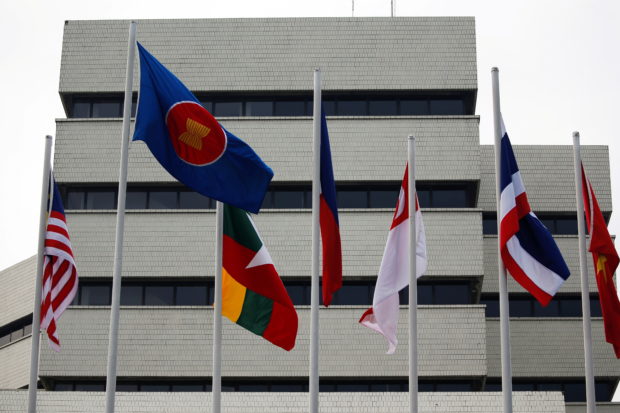
Flags are seen outside the Association of Southeast Asian Nations (ASEAN) secretariat building, ahead of the ASEAN leaders’ meeting in Jakarta, Indonesia, April 23, 2021. REUTERS FILE PHOTO
In saying this, Prime Minister Datuk Seri Ismail Sabri Yaakob stressed that a world order based on multilateralism is vital.
“Such an order would enable sustainable and peaceful co-existence of civilisations that are rules-based, open, inclusive and transparent,” he said.
He said this while speaking in his intervention note at the Asean-China Special Summit to commemorate the 30th anniversary of the Asean-China Dialogue Relations held via video conference from here on Monday (Nov 22).
The Special Summit was chaired by Brunei’s Ruler Sultan Hassanal Bolkiah as his country is the chair to this year’s Asean event. It was also attended by China’s President Xi Jinping.
Asean and China being fully aware of the need for peace and stability to attain economic development and civilised life were encouraged by the constructive tone of Xi Jinping and US President Joe Biden’s virtual meeting last week.
“China-US bilateral relations are among the most consequential in the world. While differences remain, Malaysia welcomes recognition of the collective responsibilities that both countries have towards maintaining peace, development and social progress,” he said.
On climate change, Ismail Sabri said Malaysia aspired to achieve net-zero greenhouse gas emission by 2050 at the earliest and welcomed commitments made by China and other parties at the COP-26 (2021 UN Climate Change Conference) in Glasgow, Scotland recently.
He stressed upon the need to balance between addressing climate change and the importance of socio-economic development, through the UNFCCC (UN Framework Convention on Climate Change) and Paris Agreement.
“We applaud China’s call for developed countries to fulfil their obligations by providing finance, technology transfer and capacity building to developing countries in their efforts towards addressing climate change,” he said.
Meanwhile, Ismail Sabri also reiterated Malaysia’s firm position on the South China Sea issue, which has to be resolved peacefully and constructively in accordance with universally recognised principles of international law, including the United Nations Convention on the Law of the SEA (UNCLOS) 1982.
Malaysia calls on all countries to remain committed towards maintaining the South China Sea as a sea of peace, stability and trade, and to this end, all parties should exercise self-restraint and avoid actions that may be deemed provocative, which could further complicate the situation and escalate tensions in the area.
He added that Malaysia underscored the importance of the full and effective implementation of the Declaration on the Conduct of Parties in the South China Sea in its entirety, and the early conclusion of an effective and substantive Code of Conduct in the South China Sea. – Bernama